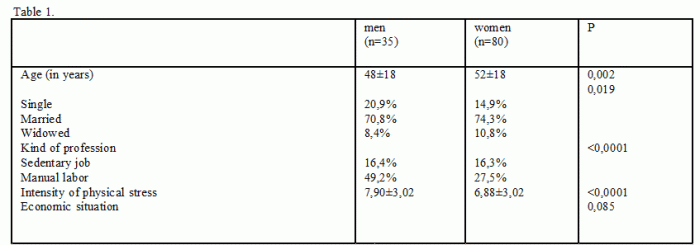|
|||||
|
|||||
Epidemiological study on depression in people with obesity in the area of Makrakomi village
A. KONTORIGA, O. MOUZAS, P. GEORGOULIAS, G. EROTOKRITOU, N. ANGELOPOULOS, M. TSAKALAKI
Abstract
The right diet and the maintenance of ideal weight contribute mostly in the health of person. It is widespread that the corpulent individuals can often present depression, stress etc. The aim of the present study is the epidemiologic study for coexistence between depression and obesity with base the indicator of body mass-BMI. The sample included 115 patients with diagnosis of obesity in the duration of a year. From each patient had taken history and measurement of BMI. The patients' demographics were noted. The coexistence of obesity and depression observed in 43 patients from the all sample. Women presented significantly higher the coexistence between the both diseases compared to men and with the most high risk was women in menopause. Encephalos 2011, 48(3):128-130.
Key words: Οbesity, depression, menopause.
It is well known that obesity is associated with depression, anxiety, compulsive behaviour and some specific personality traits.1 In the same way, other researchers have investigated an increased incidence of psychopathology in individuals suffering from obesity1,2. Epidemiological studies in the general population have indicate a different incidence of depression and anxiety between obese and non-obese individuals.
It is also well known that eating habits are influenced by psychological factors. Some people use to eat in response to their emotions such as pain, depression or anger3. Also, obesity is often considered as a consequence of lack of power and weakness or as a 'lifestyle choice"- the choice of overeating and minimal physical activity. It is prudent to understand obesity as a disease rather than a chosen lifestyle.
It is important to note that the negative body image of the individuals is related with their psychological. Researches have shown that individuals suffering from obesity express more emotional fatigue, and, in the same time, patients relate directly the extra weight with their bad body image2,3. Overall, patients with obesity experience greater psychopathology than individuals with normal weight3,4.
The purpose of the present study is to investigate depression in people with obesity measuring by the body mass index (BMI)
Material and methods
We studied 115 patients diagnosed with obesity, in area of Makrakomi residents, 80 women and 35 men, average 55 years and ages between 33-80 years, during a period of one year. The mean duration of obesity was 16.7 years(SD=6.6 years)
The sample included individuals residing in the above publication. All the patients informed of the purpose of the study and agreed to participate.
The factors investigated were demographic, social and clinicians. Recorded the sex, age, number of children in the family, the marital status of participants, their educational level in years of study, vocational and financial situation.
The height of people was measured without shoes,with the back straight and leaning on the wall. Measurements were rounded to the nearest 0.5cm of the measure. The weight of people also measured without shoes and light clothing, while the measurements were rounded to the nearest gram. The BMI calculated as weight (Kg)/Height (m). People with BMI >29.9 were defined as obese, while people with BMI 25-29.9 were defined as overweight.
Statistical analysis in the paper, continuous variables are presented as mean +/- standard deviation. The categorical variables are presented as absolute and relative (%) frequencies. Also it used t-test of student and checks between categorical variables were made by using the criterion of x2 without correction of continuity.
Results
The table 1 presents social demographic characteristics of individuals of the study.

The table 2 presents the clinical status of the individuals of the study. The 41% of the men and 33% of the women had also appeared and the disease of dislipedemia.From these patients with dislipedemia the 75% have taken therapy for the disease. Also we found out the coexistence of diabetes mellitus in 16% of men and 11% for women, like as hypertension which was 31% for men and 36% for women.
In the table 3 we observe the results of the 43 patients with obesity and the coexistence of depression (6.1 men and 31% women).

14 patients from them had taken medication for depression for over 5 years(5 men and 9 women). Also these 9 women who had the both diseases, had started medication for depression before the appearance of obesity. Finally, we realised that 12 women from these with obesity and depression had started the medicaments for depression in the duration of menopause.
Discussion
This study presents the results of the epidemiologic study in individuals in area of village Makrakomi for coexistence of obesity and depression. We did not find any difference between the mean age and the duration of appearance of the obesity in the individuals of the study.On based of the results we established that in the women with obesity coexist more often and the depression and it not rare that depression is the reason for these women to appear the obesity5,6.Also, the dangerous of the appearance of depression in women with obesity it increased in period of menopause maybe from the role of hormones5-7. In the men with coexistence of the both diseases we found out that can coexist too more others organics diseases7.
In conclusion Association between obesity and depression has repeatedly been established. For treatment and prevention purposes, it is important to acquire more insight into their longitudinal interaction7,8. The treatment of depression and obesity should be integrated. This finding indicates that obesity and depression may not only be related to behaviour but also may have a hormonal link9. Because obesity and depression often co-occur, prevention and screening should focus on both disorders and should start early.
REFERENCES